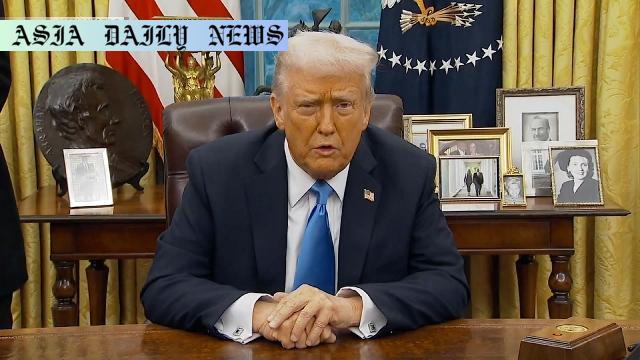Recession fears spark debates as President Trump highlights transition challenges, focusing on long-term strategic policies.

Trump’s Stance on Recession Risks
In a recent interview aired on Sunday by FOX News, President Donald Trump addressed growing concerns about the possibility of a recession. While the question specifically targeted expectations for a 2025 economic downturn, Trump avoided definitive predictions. His response, however, echoed a broader narrative about his administration’s vision for long-term economic policies. ‘I hate to predict things like that,’ Trump commented. He acknowledged that the American economy is undergoing a period of ‘transition,’ largely influenced by his administration’s efforts to recalibrate international trade dynamics and domestic economic priorities.
The Impact of Tariff Policies
During the interview, special attention was drawn to the ongoing trade dispute with China, particularly the effects of the tariff policies imposed under Trump’s administration. Critics and business leaders have flagged these tariffs as potential contributors to economic uncertainty, prompting concerns about stunted growth and volatility. However, Trump maintained that these measures are part of a ‘bigger picture’ strategy. He compared America’s tendency to operate on a quarterly basis with China’s 100-year perspective on trade and development, urging stakeholders to adopt a more long-term view. ‘It takes a little time, but I think it should be great for us,’ Trump remarked.
Stock Market Observations and Strategic Focus
One of the points Trump reiterated was the importance of moving beyond traditional barometers like the stock market when evaluating the health of the economy. While stock market trends are often treated as a reflection of economic stability, Trump downplayed their significance in the context of monumental shifts in policy. Instead, he highlighted his administration’s commitment to ‘doing what’s right’ for the nation’s long-term economic outlook. This approach underscores the complexity and scale of the changes being implemented, even as skepticism from Wall Street and Main Street persists.
Public Reception and Economic Outlook
The media coverage surrounding Trump’s recession-related remarks has sparked widespread debates across political and financial landscapes. Supporters of the administration argue that these candid responses demonstrate a pragmatic understanding of the challenges inherent in structural reforms. Critics, however, express concern that the lack of a clear stance on recession risks could erode public and investor confidence. Despite these differing perspectives, it’s evident that the long-term impacts of Trump’s policies remain a pivotal narrative for the US economy.
Conclusion: Uncertainty Amid Bold Ambitions
As the nation grapples with the implications of its economic transition, President Trump’s remarks serve as a reminder of the nuanced interplay between short-term fluctuations and long-term strategies. While refraining from ruling out a recession, the president emphasized the necessity of enduring short-term uncertainties to achieve sustained growth and stability. Whether this vision materializes remains to be seen, but one thing is certain: the stakes for the US economy have never been higher.
Commentary
The President’s Calculated Ambiguity
President Trump’s recent remarks on recession risks provide a fascinating glimpse into the administration’s economic strategy. By refusing to make definitive predictions, Trump demonstrates a calculated ambiguity that aligns with his broader political style. This approach, while deliberate, carries both opportunities and risks. On one hand, it shields the administration from being tied to specific outcomes. On the other, it leaves room for criticism, especially in the face of persistent economic uncertainties.
Balancing Short-Term and Long-Term Goals
One of the key takeaways from Trump’s FOX News interview is his emphasis on long-term planning. In defending policies like tariffs, he drew an intriguing comparison between America’s quarterly focus and China’s centennial strategy. This contrast underscores a fundamental difference in approach that could redefine how Americans perceive economic development. However, this shift in focus also demands patience from both the public and the markets—qualities that are often in short supply during turbulent times.
Recession Fears Versus Optimistic Projections
By addressing recession fears without explicitly dismissing them, Trump offers a sobering reminder of the challenges ahead. It’s worth noting that instances of economic transition are rarely seamless. The president’s remarks highlight the importance of resilience and adaptability as the nation navigates these waters. Whether this bold outlook ultimately results in ‘greatness,’ as Trump predicts, remains uncertain. What is clear, however, is that his administration is committed to shaking up the status quo.
Final Thoughts
In conclusion, while Trump’s comments may frustrate those seeking more concrete assurances, they do provide valuable insights into his administration’s broader economic vision. Whether the strategy pays off will depend on how effectively the White House addresses both immediate concerns and long-term goals. Regardless, the dialogue surrounding these issues must continue in order to promote a balanced and informed perspective on the American economy.


